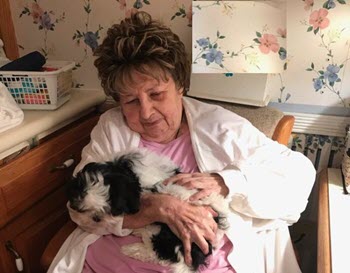Some days it feels like yesterday that I got the call she had passed during the night. Other days it feels like it happened years ago. Grief is such a complex emotion that is different for everyone. That is why it feels so complicated to me because there is no formula.
I have been surprised this past year by how often the grief I feel at losing mom is doubled by the grief of losing my father. A process I did not give myself the opportunity to go through because I became mom’s caregiver when he died. Figuring out what being a caregiver meant and dealing with the emotions it brought up was all I could handle at the time.
I have been surprised by the times I felt great sadness. It wasn’t necessarily an anniversary like her birthday or wedding. It happened in the little daily things that made up so much of our life together, like seeing something in the grocery store that I would have picked up to surprise her or the first time Tucker got groomed and not being able to bring him over to mom’s to show her. She loved it best when he was soft and smelled so good from his bath.
The hardest day may have been attending the first birthday party for a great niece who was born last year. Going to this great niece’s baby shower was the first event of a wonderful month together with mom before she died. This party was a tangible reminder of what was to come. Realizing we would not be attending the first birthdays of the other babies together and that she would not be here for my birthday or Thanksgiving was hard.
I have come to realize that staying busy and avoiding painful emotions hurts me, delays the grieving process and is exhausting. As a child, I was easily given to tears, but as an adult not so much. This past year when the grief welled up but I could not shed a tear, I gave myself permission to watch something that allowed me to cry. The tears may have started with the movie, but they were filled with the grief of my parents being gone and those tears are healing.
I have come to realize that grieving is often a physical process, not just emotional. At times I still feel exhausted and restless. I was not surprised when my mind and body were burned out last January that, for the first time, I tested positive for Covid. My immune system was so run down with all the things that I needed to do after mom’s death that Covid was the result.
One gift I have given myself is to be OK with conserving energy and saying no to anything that was not necessary. Sometimes being with other people felt overwhelming and saying no, without guilt or explanation, was an important boundary to set.
I have come to realize that being able to express negative emotions and anger about the person who has died is important. After all, death did not bestow sainthood on them and relationships are complicated. To be able to tell a funny story about them and then express sadness or anger at something that happened is known as emotional flexibility and that is very healthy.
Another gift I have given myself is to continue to honor my connection with mom by going back to her assisted living community to do food demos. Often the recipe is a family one which keeps me connected to her as I share memories with the residents. I always bring Tucker with me, not just because the residents love him, but because that is another way to honor her and the love she had for him. Actively caring for her memories in this tangible way helps me to remember mom before she lost her health, mobility and eyesight and move beyond any regrets. I find great comfort in this quote from poet Thomas Campbell, “To live in hearts we leave behind is not to die.” Mom and dad live in my heart and keeping their memory alive is an honor.
Disclaimer: The material in this blog is for educational purposes only. It is not intended to replace, nor does it replace, consulting with a physician, lawyer, accountant, financial planner or other qualified professional.
Deb is the author of “Your Caregiver Relationship Contract and “A Relationship Contract for Dementia Caregivers.” Your Caregiver Relationship Contract is available in both English and Spanish. It explains how to have an intentional conversation and the how unspoken expectations can cause problems during caregiving. A Relationship Contract for Dementia Caregivers explains how important it is to learn how your person wants to live their life out and how you, the caregiver are the most important person in this relationship, giving you tips and tricks for this journey.
Click here to learn more about Your Caregiver Relationship Contract or here for the Spanish version: Su Contrato de relación como cuidador de un ser querido. Click here to learn more about A Relationship Contract for Dementia Caregivers.
Deb is available as a caregiver consultant. She will answer the question: “Where do I start?” and find the resources to alleviate your stress. If you would like to invest a half hour to learn how she can help you, please contact her at: Free 30 minute consulting call


Deb, thank you for living your grieving process out loud! It is a hard season not often discussed. Your encouragement and vulnerability is a blessing!